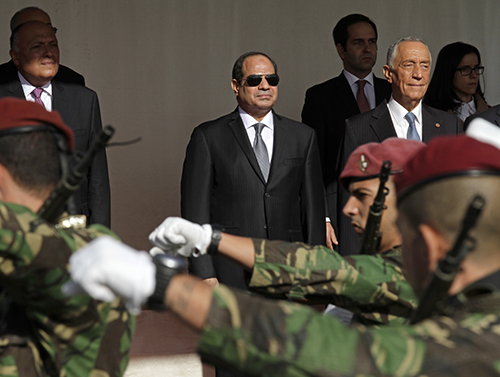In Egypt last week a journalist was barred from travel without official explanation, a reporter was accused of criminal defamation over a 2015 investigation on child prostitution, and President Abdel Fattah el-Sisi defended Egypt’s freedom of expression record. An appeal date was also set for the Journalists’ Syndicate leaders who were sentenced this month to two years in prison.
TV presenter who aired tuk-tuk driver video banned from travel
Television host Amr al-Leithy was prevented from traveling from Cairo to the United Arab Emirates on November 24. In a post to his official Facebook page, al-Leithy said he first learned of the ban when he was stopped by passport control at Cairo airport with his family and that he was not aware of any charges or open investigations against him. Airport officials did not give a reason for the travel ban, he said.
The journalist told the state-owned al-Ahram newspaper that he went to the public prosecutor’s office after leaving the airport, but staff there did not disclose information about the ban to him. Al-Leithy said he will seek clarity through official legal channels.
Last month Al-Leithy’s weekly show “Wahed Men al Nas” (One of the people), on the privately owned Al-Hayat network, broadcast an interview with a tuk-tuk driver lamenting the Egyptian government’s economic policies. The network removed the video from its online sites, but copies of it went viral. Later that month the show was taken off air. In a statement on October 15 the network said the show would not be broadcast because al-Leithy was going on vacation. The same day, al-Leithy confirmed to Al-Masry al-Youm reporters that he was going on a three-week vacation. Neither he nor the network announced a date for the show’s return, and no episodes have been aired since. Al-Leithy’s daily show, “Bewedooh” (With Clarity), was taken off air at the same time.
On October 17, the pro-government paper Al-Youm al-Saba’a reported that a lawyer named Samir Sabry had filed a complaint to the public prosecutor’s office against al-Leithy and the driver in the video, accusing them of incitement. CPJ could not determine if the complaint was related to the travel ban.
Local media reported that he is the first person with no civil society or human rights background and no charges against him to be banned from leaving the country in the recent surge of travel bans. Local and international rights groups and the United Nations have criticized Egypt’s increasing use of arbitrary travel bans against human rights defenders.
Reporter questioned over child prostitution article
Rabie al-Saadany, a reporter for the privately owned newspaper Tahrir, appeared before prosecutors November 20 on a charge of criminal defamation over an article on child prostitution in the Cairo neighborhood of Hawamdia. Prosecutors released the journalist on bail after questioning, according to reports.
The charge was brought by Essam Edris, a member of parliament who represents the Hawamdia district and who accused al-Saadany of ruining the reputation of the women of the neighborhood and seeking to destroy relationships in the community. The article, published by Tahrir in December 2015, alleged a relative of Edris’s was linked to the prostitution rings.
Al-Saadany told the local press freedom group Journalists Against Torture Observatory that he received threatening phone calls from Edris in the week after publication, which he kept recordings of but chose not to disclose to the public at the time. The journalist said he intends to file a complaint with prosecutors against Edris about the threats.
Edris’s office did not immediately respond to CPJ’s phone calls requesting comment.
Appeal date for Journalists’ Syndicate leaders
An appeal against the two-year prison sentence against Journalists’ Syndicate leaders Yehia Qallash, Khaled al-Balshy, and Gamal Abdel Rahim on charges of harboring a fugitive, has been scheduled for December 25, according to reports. The three are currently on bail. The sentence came after months of tension between the Journalists’ Syndicate and the government. The Ministry of Interior accused the group’s leaders of calling for anti-government protests and CPJ documented a police raid on the Syndicate’s headquarters in May, during which journalists were arrested.
Separately, a Giza criminal court barred members of the press from entering the courtroom November 24 to cover a hearing in the trial of six defendants accused of the attempted assassination of a judge, according to reports. No reason for the order was given.
Sisi: ‘People talk as they please’
During a visit to Lisbon last week, President el-Sisi asserted that he supports freedom of expression. “Look at the press and media in Egypt and you will find people talk as they please,” he said in an interview with Portuguese broadcaster RTP. Egyptian TV ran the interview in Arabic on November 22.
Speaking about the case against the Journalists’ Syndicate leaders, el-Sisi said it was important to note this was a criminal case and nothing to do with their journalism.
Syria and Egypt
In an official statement yesterday, the Ministry of Foreign Affairs denied reports that Egypt has sent an air force unit to Syria to assist President Bashar Assad’s military. The reports, which were carried by Iranian and Gulf Arab outlets, cited a November 24 article in the Lebanese newspaper As-Safir.
The ministry’s statement read, “These claims only exist in the imagination of those promoting them, and we all know what their aims are.”
Most Egyptian papers did not run the reports that alleged air force units had been sent to Syria, and published only the ministry’s refutation. An anti-terrorism law adopted in 2015 criminalizes the publication of information about counterterrorism efforts by the armed forces if it contradicts official statements.
President el-Sisi expressed support for Assad’s government in his interview with the Portuguese broadcaster RTP. Egypt’s position on the Syrian conflict has come under scrutiny by foreign leaders and the international press in recent months, causing tensions with Saudi Arabia.
[EDITOR’S NOTE: This post has been updated to reflect that the report in As-Safir was published November 24.]
